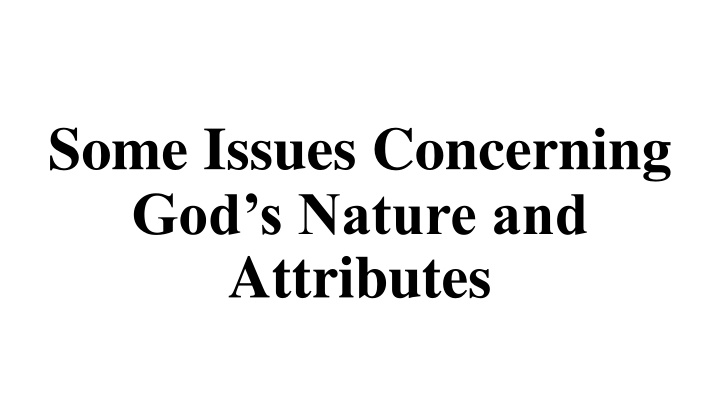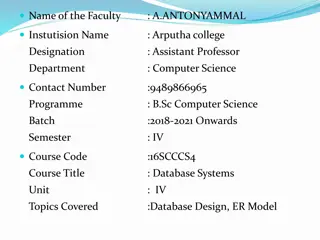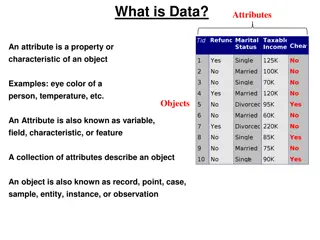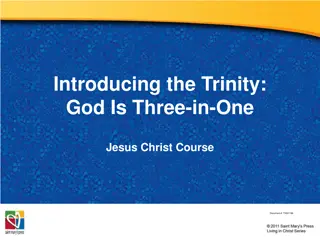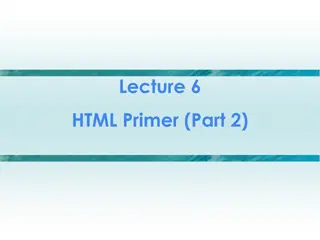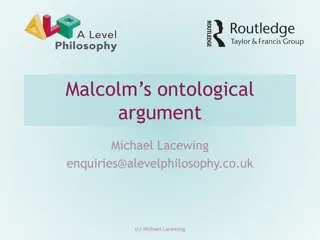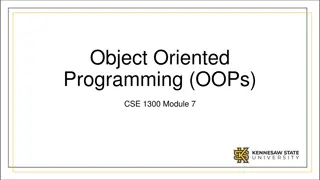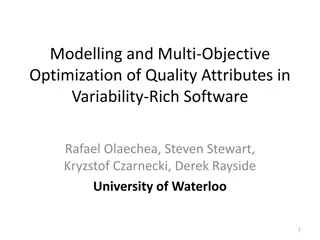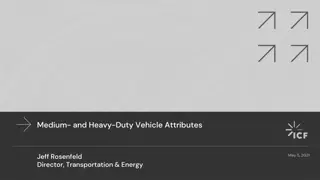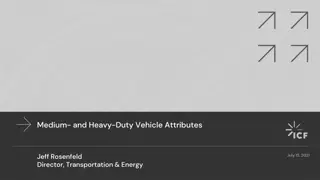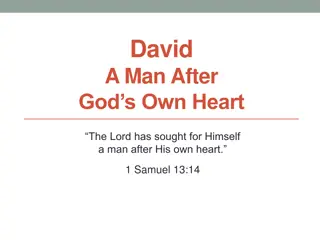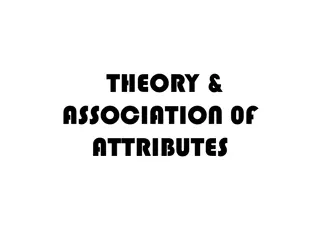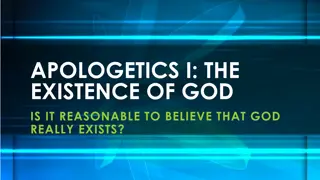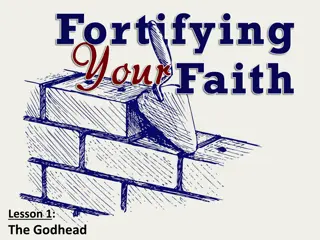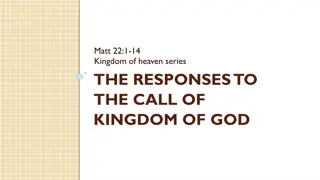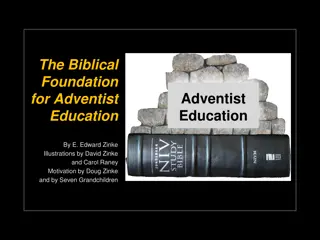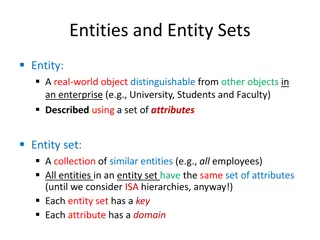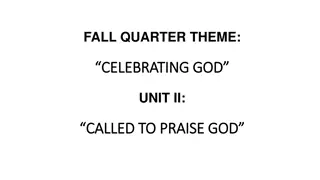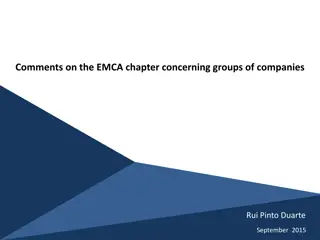Issues Concerning God's Nature and Attributes
Many discuss atheism as a religion, pondering the nature of God as a perfect being with qualities like omnipotence, omniscience, omnitemporality, omnibenevolence, and omnipresence. The paradox of God's omniscience and omnipotence raise questions about his ability to control or foresee the future, challenging traditional beliefs. Exploring the notion of God's perfection and understanding the limits of his power unveils complexities in divine nature. Can God create a rock so heavy he cannot lift? Delve into these philosophical inquiries with a critical lens.
Download Presentation

Please find below an Image/Link to download the presentation.
The content on the website is provided AS IS for your information and personal use only. It may not be sold, licensed, or shared on other websites without obtaining consent from the author.If you encounter any issues during the download, it is possible that the publisher has removed the file from their server.
You are allowed to download the files provided on this website for personal or commercial use, subject to the condition that they are used lawfully. All files are the property of their respective owners.
The content on the website is provided AS IS for your information and personal use only. It may not be sold, licensed, or shared on other websites without obtaining consent from the author.
E N D
Presentation Transcript
Some Issues Concerning God s Nature and Attributes
Religion, Perfect-Being Theology Many contend that atheism is a religion. A religion is a system of faith in and worship a god. But what is a god? There are many definitions of a god depending on the religious tradition. I define God as a perfect being Omnipotent Omniscient Omnitemporal Omnibenevolent Omnipresent
It is impossible for God to be omniscient (including knowing the future) and omnipotent. Either He knows the future, in which case he cannot change it, or He can change the future, in which case he cannot know it. God s knowledge is eternal. His knowledge accompanies his actions, and neither prevents the other. God knows the future and does not want to change it. And if He wanted to change it, He would know that He would change it and would know such a changed future. However, there is no reason to think that a perfect being would change His mind. God does not need to change his mind, and consequently knows what He decides and the future
It is impossible for God to be perfect and yet know everything. If he is perfect then he cannot know what it is like to sin, but then he doesn t know everything. Just because God doesn t physically experience sin, it doesn t mean that He cannot know about it. He observes it all the time and understands it better than we do. There is no evident logical contradiction in God s knowing what it is like to sin and God s being perfect. Through us, God can perceive what it is like to sin, not only by observing it but also by experiencing sin through us. Since God is not limited by time and space, He can have direct experience of our mental states and thereby have, through us, direct experience of joy, pain, suffering, and other examples of practical knowledge, such as building an airplane or using a cellphone.
Can God make a rock so heavy he cannot lift? Whether the answer is yes or no, He must not be all-powerful. God s omnipotence is not a license to absurdity. God can do anything that is logically possible. If God couldn t make a rock so big that he couldn t lift, in what respect He would cease to be omnipotent? However, creating a rock so heavy He cannot lift is not a task at all. Rather, it is a series of words that add up to an absurdity. It is not possible for God to perform an action that not even God can perform that s simply absurd. For example, God cannot create a God. If God created a God, then that God would be a created being and thus not a God. Another example: God cannot kill Himself or cease to exist because His nature is eternal. Furthermore, if the atheist is not satisfied, one could reply that God can create a rock so heavy he can t lift and then lift it, which is impossible. And therefore, God can do the impossible.
It is impossible for God to be perfect and to have created the universe. If God is perfect, He has no needs, and so He wouldn t have created such an imperfect universe. God didn t create the universe out of need but out of love for us. Since love is by nature other-regarding, which is giving rather than needing and receiving, God created the world to benefit humans and animals. Imperfect universe: first, God s creation cannot be perfect because a perfect entity is eternal and thus uncreated. Consequently, anything that is created (physical), even if created by God, cannot be perfect. Second, by creating the world, God gives humans the most valuable gift of living first a physical and later a spiritual life.
It is impossible for God to exist outside time and to have created the universe. In order to create, God must exist prior to the existence of the universe in an atemporal state. But without time, nothing can happen. on one side, there are those who argue that God is timelessly eternal. On the other side, there are those who argue that God exists eternally in time. More recently, William Lane Craig (2001) has argued that God existed timelessly without creation and in time with the creation and thereafter. I think that there are stronger arguments for the notion that God is an eternal and atemporal being.
It seems just unintelligible to say that an atemporal being caused the universe; what should we make of atemporal causation? And if He caused it, should he not have been there at a certain location and time? A timeless being cannot know when events occur. A timeless being cannot be the personal God that the Bible describes, as loving, caring, and intervening in human affairs. So, the most plausible solution for Davis is temporal eternalism, which means that, for Davis, God has eternally existed as a temporal being.
Stephen T. Davis (1983) and a response by Hugh J. McCann (2012): Davis defends sempiternity: an atemporal being cannot be the God of Christianity and atemporality is incoherent. A being is timeless if, and only if, it lacks temporal location and temporal extension. It would be impossible to say that a timeless being existed when the Titanic sank or will exist during the next Olympic games or has existed for several years or will exist in the future for many more years. Furthermore, temporal terms about such a being, such as past, present, future, before, after, simultaneously, always, later, next week, at 12:00 noon., and so on, would have no significance. Consequently, if God were a timeless being, sentences like God existed during the French Revolution , or God will love my child when she will be born in late March are either meaningless or necessarily false.
Hugh J. McCann: Start with Davis contention that it is implausible that a timeless God can be the creator of a temporal universe. In short, if God is beyond time, he cannot create temporal things. The problem with Davis argument is that causation is not a process and not one that is inherently temporal. Imagine a cue ball hitting an object ball thereby causing the object to fall into a pocket. Causation is not an event that exists in the world between the action of the cue ball and the object ball. Rather, causation is an explanation of how things and events relate to each other. We see certain effects, but not the causal glue or link. Consequently, the fact that God is the cause of the world does not imply that God had to be in time in order to bring the world into existence.
God is omnipotent and brings the universe into existence ex nihilo. God is not limited by time in creating the universe. The notion of creatio ex nihilo may appear unintelligible to humans. If God brought the universe, spacetime and matter into existence, there is nothing and there exist no prior moment to the universe. Consequently, God had to create the universe from nothing. And consider that God also had to fine-tune the universe for intelligent life. After all, God did not need space to create space, so He did not need time to create time. But if time already existed, then, how do we explain the existence of time? Is time a property external to God? That would not work. It would make God a subservient of time. God is omnipotent, He is not trapped, as it were, within time. Sure, one may argue, and I grant it, that God s creating the world ex nihilo is a mysterious process or event.
Another problem with sempiternity: if God exists in time eternally, it follows that temporal successions in His life must be infinite. What does infinite mean? Two meanings: potential vs. actual. God s temporal eternity implies actual infinity, which is impossible. The infinite staircase. The Grand Hotel.
What was God doing prior to the universe, twiddling his thumbs? If God is outside time, God was not doing anything. Even the act of thinking, some might say, requires the passage of time. God is not frozen from eternity doing nothing. God is actus purus, pure actuality. His knowledge and his existence are already actualized. It is not as if God has been there with cobwebs allover, waiting to start the universe. His existence is not a long period followed by the creation. The existence of the world is eternally present in God s mind, but temporally manifested and occurring.
McCann: it does not follow from Gods timeless nature that He does not have knowledge of time or even that time is not real to Him. The fact that God is beyond time does not mean that God is hidden in a dimension from which nothing can be known to Him about the world. God is omniscient, so God knows all events in time even if He does not exist in time. As Boethius points out, God s knowledge is given all at once . God s knowledge of every true proposition and every event is eternally and timelessly present in God s mind. Now this does not mean that God s knowledge of the world is simultaneous or is anything that can be explained temporally. God creates and is aware of all of history neither simultaneously nor at different times, but eternally. (McCann 2012: 53)
Let me offer at least two reasons to support atemporality. First, we have no reason whatever to argue that God must be like us, a temporal being. Second, God s sempiternity is self-serving. McCann makes an important observation: Although an everlasting God may freely choose when to create, once embarked on the enterprise he must busy himself with whatever tasks are at hand. If he has goals to achieve by his action, then like us he must await his opportunities, which are now limited by the stern taskmaster of gradual and irreversible becoming. Also like us, God s experience of his creation must be hemmed in by time: limited, in the case of the past, to memories that, however vivid, are of events that can never be retrieved; limited, in the case of the future, to anticipations each of whose fulfillment takes literally forever to come, only to vanish like smoke. Such a God may be the master of much but of time he is a slave. (p. 62)
Some theists like Richard Swinburne (1993) and Ryan T. Mullins (2014) do not worry about God s being prisoner of time. They think that, despite certain restrictions, in the end God is still, as it were, in charge of the universe. Swinburne writes, although God and time exist together...those aspects of time which seem so threatening to his sovereignty only occur through his own voluntary choice. To the extent to which he is time s prisoner, he has chosen to be so. It is God, not time, who calls the shots (40). And Mullins writes: An omniscient God would know what He is getting into by creating a physical universe and bringing succession into His life. Also, he states that Time is not God s mom, it cannot tell Him what to do. (2014: 173) I find both Swinburne s and Mullins assertions unpersuasive.
First, it is obvious that if God is in time, time cannot tell God what to do, but time undoubtedly can restrict God s actions by telling God how to do it. Second, if God is a temporal being, this implies that God s life would constitute a complete, actual, infinite succession of states, which is impossible. Third, if God were eternal, He could not create the universe. Why? Because if He has existed eternally (in time) prior to the universe, then either the universe would be eternal, or it would never be created. The universe is not eternal. Therefore, the universe would never be created!
God created the universe. But when? Suppose that God is in time and, at T-n, He plans to create the universe at Tn, (the time corresponding to the big bang). One may answer, simply, at T-1God said, tomorrow, T0, I will create the universe. But if God were sempiternal, He would never arrive at T-1because between His past eternal existence and T-1there would be a complete (actual) infinite number of temporal sequences after one, there would be another, and another, and another, and an infinite other. Between His past eternal existence and T-1there wouldn t be just an unfathomably large number of years, but rather an actually infinite number of years. Therefore, since the universe is not eternal, and since it would be impossible for a sempiternal God to arrive at the moment of creation, T-1, then it follows that God created the universe from an undifferentiated time.
If God is a temporal being, then he cannot know the future. And if God cannot know the future, then He cannot be omniscient. Nelson Pike (1965): if God knows at T1that I will write these words at T2, then my writing these words is necessary. This means that if God is omniscient and knows at T1that I write these words at T2, either I am not free, or God is not omniscient. If I am free, it would seem, I can refrain from writing these words. But if I can refrain from doing so and my decision is not yet made, then it is not possible for God to know what I will decide. The alternative, which many theists wish to deny, is that humans are, after all, not free. But one of the problems is that, if we are not free, we cannot justify the existence of evil in the world.
Still, some observe that if God is in time and God eternally knows at T1that I write these words at T2, it is not God that causes my writing these words at T2or that it was inevitable or even determined. God s knowing at T1that I write these words at T2is not the cause of my writing these words. There is no causal connection between God s knowing what I will do and what I will do. Rather, it is because I will freely write these words at T2that God knows at T1that I will write these words at T2.
Granted, it does not follow from the fact that God knows that I write these words that God is the cause of my writing these words. But this move does not get one out of the problem of determinism. One can say that God does not arrange the universe such that, at T2, I must write these words. Nevertheless, God knows that I write these words prior to my writing these words, He cannot be wrong because He is God, and He is not the one who determined or caused me to do it. Then, something else must have determined it. And therefore, if God is in time and knows what I will do, His knowledge of my future actions imply that I am not free, i.e., I had to write these words. Possible solution (?): I am writing these words at T2. Suppose that time travel in the future will be possible. At T1, you travel to T2and see that I am writing these words. When you go back to T1, then at T1you would know that I will write these words at T2, but determinism is not the case?
Our understanding of physics tells us that traveling into the distant future is possible according to the time-dilation effect of Special Relativity: time moves slower the closer it approaches the speed of light and freezes at the speed of light. Suppose: I travel for eight Earth minutes at lightspeed. To picture this, consider that for an observer here on Earth, a photon is emitted from the Sun approximately eight minutes before we receive it. If it were possible to observe the photon travel, it would appear to us to move, well, at the speed of light. If there were a clock on this photon, the time would appear to be frozen.
I depart from the earth in a spaceship at luminal velocity. Any clocks onboard would be frozen. For me on the ship, nothing would look different. Suppose there is a tachyonic antitelevision system that enables me on board of the ship and my daughter on Earth to watch each other during my trip. What does my daughter see when she turns on the monitor of the tachyonic antitelevision? She sees me frozen because, relative to her reference frame, I am not experiencing time. What I see on the monitor is my daughter s aging before my eyes. Relative to my reference frame, I see my daughter going from the age of twelve to older than I am in a few of my seconds. In a manner of speaking, relative to my reference frame, what I watch on the screen of my tachyonic antitelevision is my daughter s future.
But what if I could go back to my original inertial frame of reference? In that inertial frame of reference, I would find my daughter at the age of twelve. But I would know her future! God, therefore, from outside time knows our future in the same way. But why not just say that God was atemporal prior to creation and then He voluntarily created and entered into time since the start of the universe? I argue that it is an unwarranted solution because (a) it is a form of gratuitous anthropomorphism and (b) it is an ad hoc, self-serving move.
It is impossible for God to be both non-physical and personal. The idea of a bodiless person is inconsistent. But how do we know that bodiless minds don t exist? Just because we normally experience embodied beings, it doesn t follow that only embodied beings are persons. God is actus purus. According to Aristotle, something that is potential has not yet come to be. For example, the wood of a tree is a potential chair, but not yet. Some change or cause is necessary to bring the wood from a potential chair to an actual chair. Thus, if God experienced any kind of change, then He would not be God. Since God is perfect, there is nothing He could gain that would improve Him. And therefore, in the previous section I argue that God does not straddle between time and atemporality. So, God is a person. He is a rational being.
It is impossible for God to be both just and merciful. Justice requires that every person be treated exactly as they deserve, whereas mercy requires that people be treated more favorably than they deserve. The two are incompatible. First, the concomitance of justice and mercy is not logically contradictory. God can have such characteristics without their ever conflicting with one another. God can balance justice and mercy perfectly. Furthermore, God does not necessarily punish humans: religious people often use the father metaphor for God. I prefer the mother metaphor because God gave birth to existence. Mothers are neither judges nor executioners; rather, they are nurturers, educators, and they unconditionally love their children. God created us and does not judge or punishes us, but rather mends those who are morally flawed. He unconditionally loves all humans.
If God is omnibenevolent, He cannot be free; if He is free, He cannot be omnibenevolent. If God is omnibenevolent, then by His very nature, He must always do the very best thing it is possible for Him to do. So, if He creates a world, and there is a best creatable world, then he must create that world and not any other inferior world. But, if He must create the best possible world due to His nature, then God is not free and, consequently, He is not deserving our gratitude and praise for creating us and the world because He could not have done otherwise. Therefore, God is not free.
Such an argument is based on a misunderstanding of freedom and on an anthropomorphic, and thus narrow, conception of freedom. Regarding human beings, we say (roughly) that an agent is free if and only if the agent was not determined or compelled by external or internal f There is a distinction between a determined and a free action. If I am forced at gunpoint to do something, and I do it, then I was not free to do what I did. The idea of freedom becomes significant in situations that involve torn decisions: should I stay home and read a book, go out and play soccer with my friends, or visit my parents? Suppose no one is forcing me to choose and I choose, let us say, to visit my parents. In this case, we would say that my choice and my action are free.
God is omniscient and never torn between different options. He eternally knows what He shall do. He knows what the right choice is and is never mistaken about it. God is not presented with several options that He weighs before deciding which one to choose. But one may still ask this: the bottom line is that if God is free, could He or could He not decide not to create the best possible world? Perhaps He could, but He would not because He knows and freely chooses to make the right decision, a decision that exists eternally in God s mind.
The bottom line: atheists assume that, if an omnibenevolent, omnipotent, and omniscient God exists, this God must immediately create the best of all possible worlds. And their idea of the best world is what I call a hedonistic world. This is a world devoid of evil and suffering a heaven on earth, perhaps. However, there are many reasons to think that such a world would not be the best. First, such a world would contain physical beings. It is hard to see that physical bodies never suffer, never fall, never die, never feel pain. Second, assume that the atheists do not expect a completely pain-free world. The atheist my observe that God can easily eliminate, let us say, cancer, child abuse, famine, birth defect, and, perhaps more. But if that were the case, imagine how noncultural, non-educational, unartistic, unenlightening, and dull that world would be. I think the old proverb no pain, no gain is appropriate here. The sort of world that atheists expect is a world in which humans would be unable to develop science, art, technology, or philosophy. Perhaps, if God had created such a world, people would have complained about even the minimal suffering and pain that were due to this world s physical nature. So, it is quite possible that this is the best world for us to acquire knowledge, learn morality, and experience reality.
